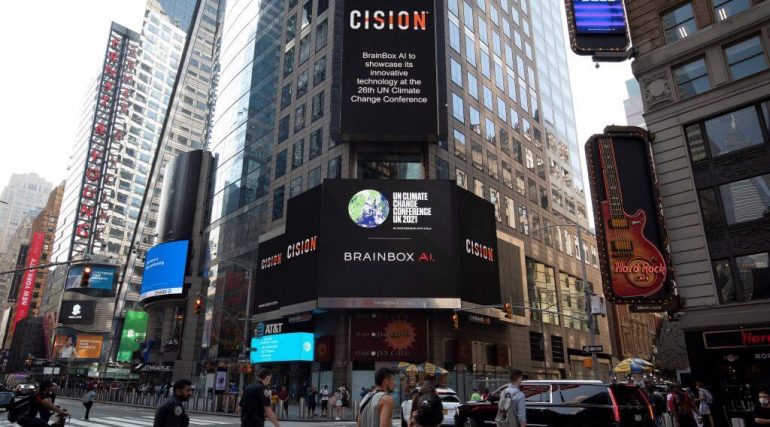Coupled with a $27 million CAD ($20 million USD) investment, BrainBox AI said it is acquiring ABB’s multi-site retail (MSR) energy management system to further its work on technologies that reduce greenhouse gas emissions from buildings.
ABB’s system provides central monitoring and management of multiple sites remotely. The technology delivers energy performance and analysis through any internet-enabled device.
BrainBox AI described ABB as a returning lead investor and global partner.
The acquisition will enable BrainBox AI to help retailers lower their greenhouse gas emissions and utility costs without replacing their existing environmental management systems. ABB’s MSR technology will work in tandem with BrainBox AI’s artificial intelligence (AI) optimization technology that helps manage HVAC systems in buildings, according to BrainBox AI.
As part of the deal, ABB’s staff in New Hampshire will become BrainBox employees, and BrainBox will take over the company’s more than 12,000 retail locations.
The Government of Québec acted as the lead investor, contributing $13.5 million CAD ($10 million USD) of the overall investment. BrainBox AI described ABB as a returning lead investor and global partner.
Founded in 2017, BrainBox uses AI to help lower energy consumption in buildings. BrainBox’s solution uses deep learning, cloud-based computing, and autonomous decision-making to predict a building’s thermal load, which then enables the HVAC system to operate autonomously. The thermal load is the amount of energy that needs to be added or removed from a space by the HVAC system to keep it at a comfortable temperature.
Buildings account for nearly 40 percent of energy-related global carbon emissions, according to the Rocky Mountain Institute. The Government of Canada has committed to achieving net-zero emissions by 2050 in order to fight climate change. Achieving net zero means the economy either emits no greenhouse gasses or it offsets its emissions.
ABB has more than 50,000 employees in 100 countries, and claims to develop products, solutions, and digital technologies that enable energy efficiency and a low-carbon society across all sectors.
RELATED: BrainBox AI’s Series A round reaches $30 million following EDC top-up
BrainBox AI said that the investment made through Investissement Québec further emphasizes the provincial Ministry of Economy, Innovation and Energy’s unwavering support for technologies that contribute to the fight against climate change. With time running out until the government’s net zero deadline in 2050, participation from the public sector is a must, the startup said.
BrainBox AI is not the only startup combining AI and HVAC technology. Parity raised $8 million CAD in 2022 to expand in the United States and Canada to take advantage of new rules in the United States (US) that will fine buildings that produce high emissions.
A number of large urban markets in the US, including New York City, are enacting legislation that will set limits on emissions from large buildings in order to help combat climate change.
Parity’s platform controls existing HVAC equipment in multi-residential buildings, and claims to reduce energy consumption by 20 to 30 percent.
While Parity focuses on the multi-residential market, BrainBox AI targets real estate clients in various sectors, including office buildings, hotels, commercial retail, grocery stores, airports, and more.
Another startup, Adaptis, begins the decarbonization process even earlier. Adaptis claims its platform automates and optimizes the planning process for building owners and consultants who are working to make their properties more energy efficient and reduce greenhouse gas emissions from their buildings.
At the time of its $2-million CAD raise in March, Adaptis CEO and co-founder Sheida Shahi told BetaKIt, “Using deep tech to do deep decarbonization is really where we think the gap is, and that’s what we’re filling.”
RELATED: Adaptis secures $2 million CAD to help building owners move to net zero with AI
For example, some municipalities only require that buildings reduce their greenhouse gasses by 10 to 15 percent, which may be done by ramping up HVAC systems, redoing the windows or other minor adjustments, according to Shahi. But she noted that when you’re dealing with the federal government or the City of Toronto, which has committed to 80 percent decarbonization of its building stock by 2050, “You need to get creative on how financially you’re going to make that happen or feasible.”
BrainBox AI closed its Series A financing round in 2022, securing $30 million USD overall. The close added an additional $6 million USD to the Series A round, which had an initial close in October of $24 million USD. When it raised the $24 million, BrainBox said that it was working to raise a “top-up” within six to eight weeks from additional investors on the same terms and valuation as its first Series A close.
BrainBox AI has more than 150 employees and says its solutions are installed in over 100 million square feet of commercial space, and has distribution partnerships in Australia, the United Kingdom, and Ireland.
The startup developed its AI technology in collaboration with the US Department of Energy’s National Renewable Energy Laboratory, IVADO, and several Montreal-based universities, including École de technologie supérieure.


